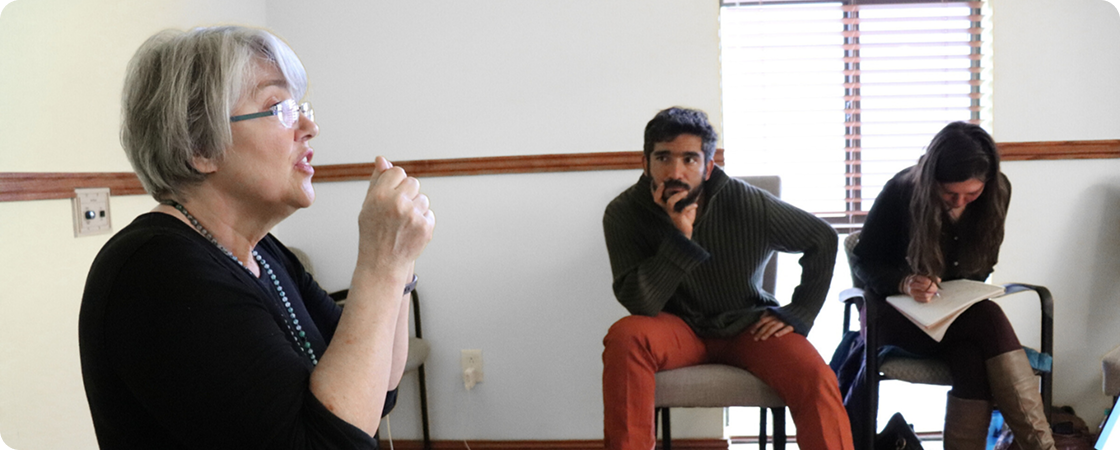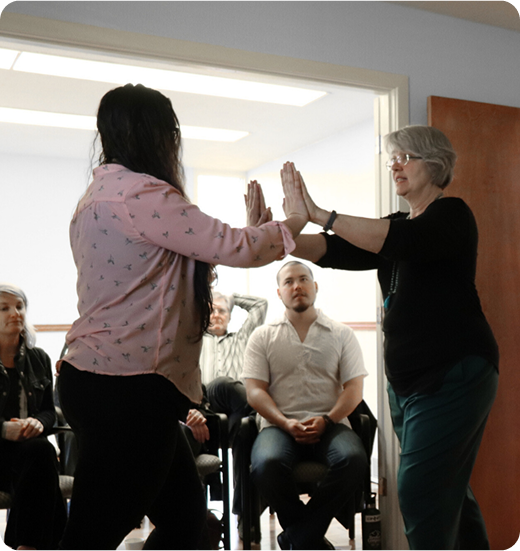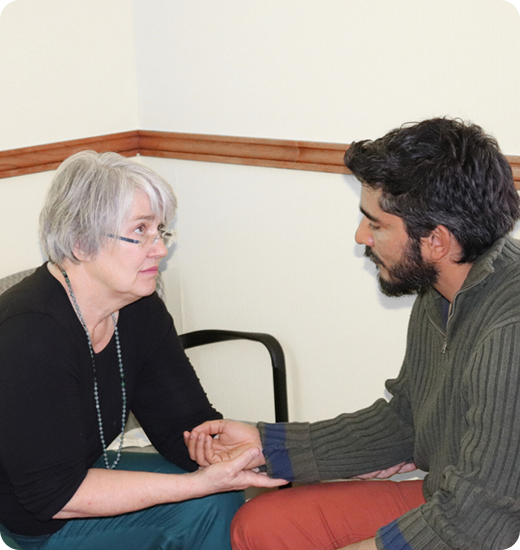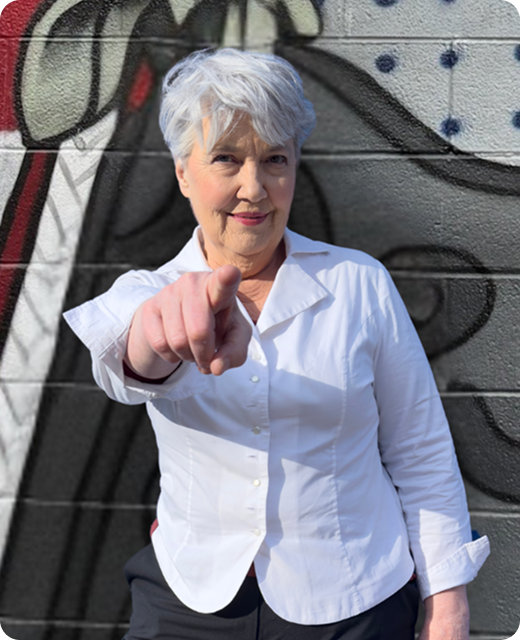"With you, trust comes naturally; you have honor woven into your fabric and that goes a long way when entering new territory in a coach’s office. Something that I learned early on in my sessions with you was that I truly was in the driver’s seat"
Defy the Gravity of Your Emotionally Immature Parent
Struggling With Poor Boundaries? Compulsively People Pleasing? How’s Your Inner Perfectionist Doing?
It’s Time to Defy Gravity, & Release Yourself from the Orbit of Your Emotionally Immature or Personality Disordered Parent
You May Present Yourself Well, And Others May Even See You As Confident And Capable.
But deep down, you're filled with self-doubt. You bite your tongue to avoid revealing how you really feel—because you know how it’ll go: they’ll either ridicule you or make it about themselves. You’re always on alert for signs of distress in others, because you’ve learned that it might turn into an explosion of rage. You’re terrified of conflict, because you’ll just end up being attacked, being wrong.

Even though you intellectually know better, you find yourself pulled back into your parents’ emotional orbit. And even though you want to break free, you notice the patterns:
🌀 You struggle with boundaries (even when you know you need to speak up).
🌀 You people-please (even if it means abandoning your own needs).
🌀 You aim for perfection (even though you know it’s impossible).
You’re stuck in a shame spiral—trapped between the anger you feel toward your parents and the desire to earn their approval. It's exhausting, confusing, and painful.
But maybe the hardest part?
You don’t really know who you are. You don’t even know that it’s okay to ask that question—or that it’s your right to live according to your own needs and values.
You are walking on eggshells.


Having an emotionally immature parent, even one with Borderline Personality Disorder, or BPD, or with Narcissistic Personality Disorder, or NPD, isn’t always easy to identify. Particularly if you’re the child of one. If you’re unsure, check out this article I wrote.
As you look around, you feel how foreign you are from others who aren’t constantly second-guessing themselves, who are at ease with being less-than-perfect, and comfortable in relationships where they can let themselves be themselves.
This is a love letter to all those not seen, to all those given the impossible task of being the parent to their parents. Of being the unwilling recipient of their parents’ often bizarre expectations. Of not being seen at all, for the wonderfully complex, unique beings you actually are. As an expert on immature parents, I found clients with the same issues coming in to see me. Like me, they were exhausted. Numb. Constantly overwhelmed, trying to control every facet of their existence.
You Are Not Who Your Parents Wanted You To Be. You’re Not Yet What You Can Be.
Professionally, moving beyond perfectionism to risk-taking and exploration, beyond poor boundaries to assertion. Personally, knowing the joy of true intimacy with another, rejoicing in what you share, and energized by your differences.
And finally, to know that you are inherently worthy, to savor another’s worth. It is not enough to know intellectually that you are worthy. You must feel it in your bones. That your greatest gift to the world, the gift that underlies all others, is the next breath you take.
Let’s take it together…start here!.

WHO AM I?
Hello, I'm Inga!
I was born to two Adulting 101 dropouts! I know what it’s like not to be seen. To be invisible. Mom: “Make me feel better about myself”. Dad: “Who’d you say you were again?”. I was becoming a person that didn’t match the ideal child of my educator mother and psychiatrist (yup!) father…and so instead, I became invisible. I ended up both taking responsibility for the reactions of everyone around me, and believing I would inevitably fail.
I arrived at the age of adulthood without the first clue of how to actually, well, “adult.” But along the way, I met my people. And they saw me, as I emerged, visible.
And over the last 25 plus years, I’ve had the profound privilege of fighting alongside my clients. Pulling the damaging lessons of their immature parents out by the root. Going to the intellect, then past the intellect, to the body. The body that shrinks, at the moment you know you’d be better served by standing tall. That surrenders when you need to assert, or shuts others out when you most need to lean into their comfort. I speak to you as one of you, and I see in you the seeds of whom you can become.
When I created my own group for Adult Children of Those with Personality Disorders in 2018, I brought what I understood was needed, according to my clients, and brought in my own somatic exercises…many generations of groups since, I now bring client-approved and -tested course to you!
WHO AM I?
Hello, I'm Inga!
I was born to two Adulting 101 dropouts! I know what it’s like not to be seen. To be invisible. Mom: “Make me feel better about myself”. Dad: “Who’d you say you were again?”. I was becoming a person that didn’t match the ideal child of my educator mother and psychiatrist (yup!) father…and so instead, I became invisible. I ended up both taking responsibility for the reactions of everyone around me, and believing I would inevitably fail.
I arrived at the age of adulthood without the first clue of how to actually, well, “adult.” But along the way, I met my people. And they saw me, as I emerged, visible.
And over the last 25 plus years, I’ve had the profound privilege of fighting alongside my clients. Pulling the damaging lessons of their immature parents out by the root. Going to the intellect, then past the intellect, to the body. The body that shrinks, at the moment you know you’d be better served by standing tall. That surrenders when you need to assert, or shuts others out when you most need to lean into their comfort. I speak to you as one of you, and I see in you the seeds of whom you can become.
When I created my own group for Adult Children of Those with Personality Disorders in 2018, I brought what I understood was needed, according to my clients, and brought in my own somatic exercises…many generations of groups since, I now bring client-approved and -tested course to you!
WHAT YOU CAN EXPECT
Defy Gravity, & Release Yourself from the Orbit of Your Emotionally Immature
My coaching program is your path to finally breaking free from the emotional orbit of an emotionally immature or personality-disordered parent—and reclaiming your voice, boundaries, and sense of self.

For those of you who want a full experience, the complete course includes:
An initial 50 minute intensive coaching session to hear your story and understand the impact of your emotionally immature or personality disordered parent
3 additional 30 minute coaching sessions, either online or in person, while you take the online course
Full access to my online course, including brief videos, articles to listen or read, comments section for further feedback, and exercises to practice
Text support via Signal between sessions
Yours for just $1195
Payment plans are available. (3 installments of $450)
For those who want the stand-alone online course, which can be done in conjunction with your therapist for additional support if needed:
Full access to my online course, including videos, articles to listen or read, comments section for further feedback, and exercises to practice.
Text support via Signal for six weeks
Yours for just $495
My hope is that, with sufficient interest, we might add a zoom group every other week. It is nothing less than magical to hear the stories of others mirroring your own, and to experience the deep understanding and support from others who truly get you!
Real Stories. Real Change.
Each person you’ll hear from once felt stuck, shut down, or overwhelmed. These are their stories of reconnection, regulation, and renewal.
BLOGS
Explore the Deeper Dive
Unlock insightful articles and strategies for personal growth, healing, and living your fullest life.

Take the Quiz: Were Your Parents Emotionally Immature or Personality Disordered?
If You’re Wondering if You Belong Here…
Successful business woman standing in front of bright door in concrete interior with shadow on floor. Future, success and dream concept
Some of you are all too clear. Your parent, parents, abused you, neglected you, drew you into their madness in a way that had you questioning your reality…and you know that its left an impact. You’re ready to heal.
However…
Others may be saying, “it really wasn’t that bad.” You recall many times when your parent or parents DID show up for you, did give you what you needed. You may even feel disloyal to them in even considering considering this possibility.
Let’s Correct the Lessons You Learned
What if, instead of thinking this is about slamming your parent/s, you view this as an opportunity to address the malware in your system! Even the best of parents may have given their children a “lesson” or two that later turned out to be misinformation. A loving mother unwittingly communicates poor self esteem as she sacrifices perhaps a little too much for her family, and cares not enough for her own needs. A loving father may be too consumed by a need to provide that he fails to carve out enough time to share his wisdom with his children.
In both these cases, and in many others, the work of the maturing child might be as simple as applying a simple anti-virus to the program.
My suspicion though is that you may be in between. Neither in the land of the mature and flawed human who was, is, your parent; nor in the land of the profoundly abused. So, in answer to your question, here are six simple elements that make up a healthy-enough parent. I would encourage you to give a rough estimate, from 1-5, for each parent, with 5 being “knocked it out of the park.”
Attunement:
This parent shows attention to the child, and with a fair degree of accuracy, identifies and acknowledges the child’s experience. The child experiences being seen, and has the experience that the parent’s observations are either true, or that the parent is open to correction if it doesn’t feel true. The non-attuned or sporadically attuned parent, including those who are overwhelmed by conditions beyond their control, leave the child floundering in a sea of overwhelming and confusing feelings and thoughts. The misattuned, gaslighting parent, projects instead their own feelings and beliefs onto the child, leaving the child questioning their own reality, and misinterpreting their own inner signals.
Example: Dixon, a five year old, comes running into the kitchen, where dad is making lunch. Dixon is clearly upset, too upset to tell his dad what’s going on. Dad turns to Dixon, squats down, embraces him until Dixon is soothed, and then asks him questions, and helps him solve the problem. He helps Dixon identify…give words to…what he’s feeling. Then he helps his child figure out what to do with those emotions and if needed, make a plan for what to do with the situation that created the distress.
1 2 3 4 5
Able to Admit Mistakes:
No parent is perfect, and healthy-enough parents don’t try to be. So, given that they’re always trying to get better, they’re willing to check in with themselves. To experience and benefit from insight. “Why did I just say that?” “I can’t believe I just yelled at you!” They are willing to admit they’re wrong, and have a discussion, because it doesn’t mean they’re a bad parent, but instead a parent that did badly. Lack of insight is the most important quality that marks a personality disorder: no Borderline or Narcissist is psychologically capable of seeing themselves realistically and, if needed, changing course.
Example: Sylvia, a mom to 8 year old twins, is not, I repeat, not having a very good day. So when she comes home from her job, and the boss that goes with it, to her twins messing up the kitchen but good as they attempt brownies from scratch…and a dad who’s disappeared into the garage…she loses it! Until she sees the shocked look on their faces, and a switch goes off. Sylvia takes a deep breath, brings her hand to her forehead to soothe herself, and says, “I’m so sorry. I had a rough day at work, and I’m taking it out on you. That’s wrong.”
1 2 3 4 5
Parent as Consultant:
Foster Cline wrote a book, Love and Logic, years ago, in which he basically recommended a parenting style based on empowering children to make their own choices with parents as consultants, helping the child to make healthy decisions based on likely consequences. The other two types are: 1) Helicopter, in which the parent does for the child, and shames other adults and children for not accommodating the child’s irresponsible actions (for George RR Martin fans, think Cerisei and Jeoffrey) and 2) Drill Sergeant, in which the parent orders the child to act in a certain way, allowing for no discussion whatsoever, and reducing the child’s ability to, and confidence in, navigating choice as they move into the world.
Example: Jane, 14, comes home smelling of alcohol. Mom, instead of losing it, calls Jane over with “we need to talk.” Jane, having been raised with a consultant mother, knows that she’s not headed for a harangue, but a discussion, and is more likely to agree. They sit, and mom identifies the smell, “honey, you’ve been drinking, or at least spending time with those that do.” Then both engage in an exploration of what-if’s, if needed waiting until Jane sobers up, including possible impact to the brain and also impact to the social network Jane is keen, as most teens are, to belong to. Mom listens, advises, is honest about her own fears…but she doesn’t lecture. She doesn’t threaten. And Jane, in making an informed decision about if, when and under what conditions she does smoke, continues to keep mom in the loop instead of hiding. And that maybe that means that, when she’s offered a ride home by a friend who’s clearly inebriated, she decides on her own to turn that ride down.
1 2 3 4 5
Parent at all Stages of Development:
Depending on which mental health icon you’re into, there are multiple ideas for explaining what the child naturally is inclined to learn at different ages. It may surprise you to know that, not too long ago, children were seen as little adults in many cultures, and treated as such, often with responsibilities that were not appropriate for them. For example, the adage, “children should be seen and not heard” is at odd with what most people would now agree, that children should not only be heard, but listened to (see above). Key here is that healthy-enough parents know what is not yet appropriate, and what ship has sailed.
And regardless, the child is always treated with respect.
I’ve attached a PDF from the Hazelden Institute, created quite a while ago to explain the different stages and how parents need to respond at each stage. As some of you know, Hazelden is a premier drug rehabilitation program that long ago reframed addiction, not as a reflection of weakness or poor character, but instead as, more often than not, a result of developmental trauma.
Example: Ralph, a father to a 12 year old daughter, remembers the times he used to tickle her when she was 7 or 8. Then, she would laugh, and they would always end with a big poppa hug. But now, she’s beginning to change…in all kinds of ways. And one of them is that the tickle game is no longer fun, or meeting her need to push away, and start connecting with her peers. So despite the absolute fact that he adores his daughter, he respects her boundaries. And occasionally, she still lets him give her a hug. He also looks forward to the day when, as a more mature teen, she’ll start struggling more with deeper issues…but knows she’s not yet ready for those adult conversations.
1 2 3 4 5
Well-Regulated:
We are all both human and animal, and at the start, most definitely the later. No ability to self-soothe before 18 months, tantrums all during the terrible twos, and also great excitement…with little to no inner regulation to keep us safe and emotionally “appropriate,” so we need our parents, and other adult caregivers, to be the regulation for us. The calm in our storm, the safety net keeping us from running into the street, the delineator between discipline and punishment.
Example: Fred, an excitable ten year old, is trying desperately to get on his father’s last nerve. It’s late at night, Fred’s running around the house instead of going to bed, and refusing to brush his teeth. But Dad isn’t yelling. Dad isn’t losing his cool, nor is he getting chilly. He’s firm, centered, and confident…catching his son on the fly, he sits him down next to him, looks him in the eye, and says, “I know you don’t want to go to bed, but life is sometimes about doing things we don’t want to do, but need to.” Fred can physically sense the steady strength in his dad which, like a contagion, infiltrates his nervous system, and reluctantly, goes for the toothbrush.
1 2 3 4 5
Good Social Skills:
Children learn more by observation, by “what is seen,” much more than by “what is said,” and that goes for how healthy-enough adults interact with other adults. Children model what they see. So they’re more likely to know how to have a productive disagreement when they observe their parents working things out in a respectful way with each other. And when they’re with parents out in the world, and the parent engages with a friend or acquaintance in an enjoyable and supportive way, it’s the children that learn early on the algorithm of making and keeping friends. Seeing good social skills played out daily, they internalize not only the skills that will benefit them both personally and professionally, but the understanding that people can be a pleasure, and an opportunity to learn and grow.
Example: Little Inga (yup, me), at 10 years old, is standing in line at the World’s Fair. It’s a long line, and would be miserable on this hot day, except that she’s observing her mother starting a pleasant conversation with the people in front of her. After observing for a few minutes, Inga turns around and uses the same basic pattern to converse with the people in line behind her. The line goes pretty quickly, considering!
1 2 3 4 5
Well, How’d You Do?
If you got mostly 4’s and 5’s, I’m really happy for you…but I suspect if that were the case, you wouldn’t have started this online course to begin with! Maybe you did, but in one or two of these qualities, your parents didn’t do very well. I would say an average of 18 or below puts you in very good company…welcome!
You belong here.
Let’s get started.
Frequently Asked Questions
Quick answers to help you feel informed and confident in your next step.
What are some things about your practice I need to know in determining whether you’re a good fit for me?
After being in clinical practice for over two decades, I’ve brought my focus to two main areas. I address the needs of adult children of emotionally immature and personality-disordered parents, Defy Gravity, as well as those experiencing overwhelming stress and the revitalization of numbed lives, Overcome Overwhelm.
For each of these areas, Defy Gravity and Overcome Overwhelm, I provide both in person and zoom coaching. The full program for each of these includes both individual sessions with me and an online course which you can access at any time, with no time restrictions.
I also make the online course available on its own, for those who want additional hacks to the existing health regimen they feel confident about.
To understand my approach, it’s also a good idea to read some of my “Deeper Dive” articles.
To be absolutely clear, I do NOT accept clients as a psychotherapist. Some among you may be experiencing clinical-level depression or PTSD, as opposed to the blues or an accumulation of stress. The hybrid model of using my coaching offerings in conjunction to working with a licensed psychotherapist towards a common goal–your ultimate vitality and purposefulness–is highly effective in my experience.
I like your website, and think you might be a good choice for me: what’s my first step?
You can immediately sign up for one of my coaching courses. However, if you want a more tailored experience, or have more questions before you take the plunge, scroll down to the contact form below, and send your question. After I respond via private email, we may also hop on a discovery call. You’ll have an opportunity to ask me what you need to know in order to make a well-informed decision, to get a sense of who I am and what I might offer you, and see how comfortable you are in my real or virtual office.
I’m actually in a fairly good place, I just want to become even healthier, more whole. How do you work with this?
Welcome to coaching! Life coaching is designed for those who want to further enhance their lives. I myself have benefited greatly from other life coaches as I’ve made significant transitions in my life, and have found that, along with clarifying the presenting issue and goal through practical problem solving, parts work (similar to IFS) and narrative therapy, can be extremely helpful.
As I am also a Licensed Massage Therapist, I may also include bodywork for my in person clients at their discretion. Bodywork includes Somatic Experiencing and CranioSacral Therapy to help regulate the body, allowing people to slow down and think more clearly. It also unearths hidden negative beliefs and stressful experiences, where they live, in the body.
My clients may do intensive work for a while, then not see me again for a month or a year, until they want to include my work to once again enhance their health and wellbeing. I absolutely welcome this as-desired (PRN) relationship, and look forward to exploring with you a unique plan that suits your needs.
What are some pointers to keep in mind, so that I can get the most for my investment?
Show up, on time, ready for the work. If we’re meeting via Zoom, please set yourself up for success! A quiet room, where you will not be disturbed, as well as a solid wifi connection, is best.
I’ll give you something to think about, some activity or exercise to perform, after every session, so that you can bring our work into the life you want to improve. Do it.
If my approach isn’t working for you, let me know. Through my twenty five+ years in practice, I’ve become skilled in multiple areas, so I can certainly adjust my approach to better serve your needs.
Particularly if you struggle to get in, stay in, your body, you’ll find that we work better if we initially build some momentum. It is important that you make time to come on at least a bi-weekly basis. After this, we’ll explore a schedule that works for you. We’ll also check in to see if my approach is right for you.
Recognize that the work we’ll be doing, regardless of which coaching option you’re interested in, is somatic (embodied). It digs deep, and actually impacts your body physically. If you don’t believe that you’re open to somatic work, or that it might be too much for you, be honest. I may not be the right person for you. You decide whether it’s worth a try.
I’m already working with a therapist and am looking for complementary services. Would you be open to working with me and my therapist?
My coaching packages’ fees are listed, with an option to pay over time. Additional coaching, depending on the time you need, is available at $225 per 60 minute hour, $150 per 30 minute half hour. Extended sessions are also available. Extended sessions are also available in 2-hour blocks, including coaching outside the office, and are available at $375
Do you accept insurance or sliding scale?
No, but I am willing to create a payment plan for well-motivated clients whom I believe the courses can help.
Be well, and I look forward to meeting with you!
Feel free to contact me.
It’s Time to Step Out of the Shadows—and Into the Life That’s Truly Yours
You are not broken. You were shaped by people who couldn’t meet your emotional needs—and it’s time to release their grip on your life. This course is your invitation to finally be seen, to reclaim your boundaries, and to live from a place of self-worth—not shame.
Here’s a free gift to get started:
My grounding exercise, to help you get centered in your busy day. I’ll occasionally also send special offers and insights (I promise, I won’t deluge your in-box!)

